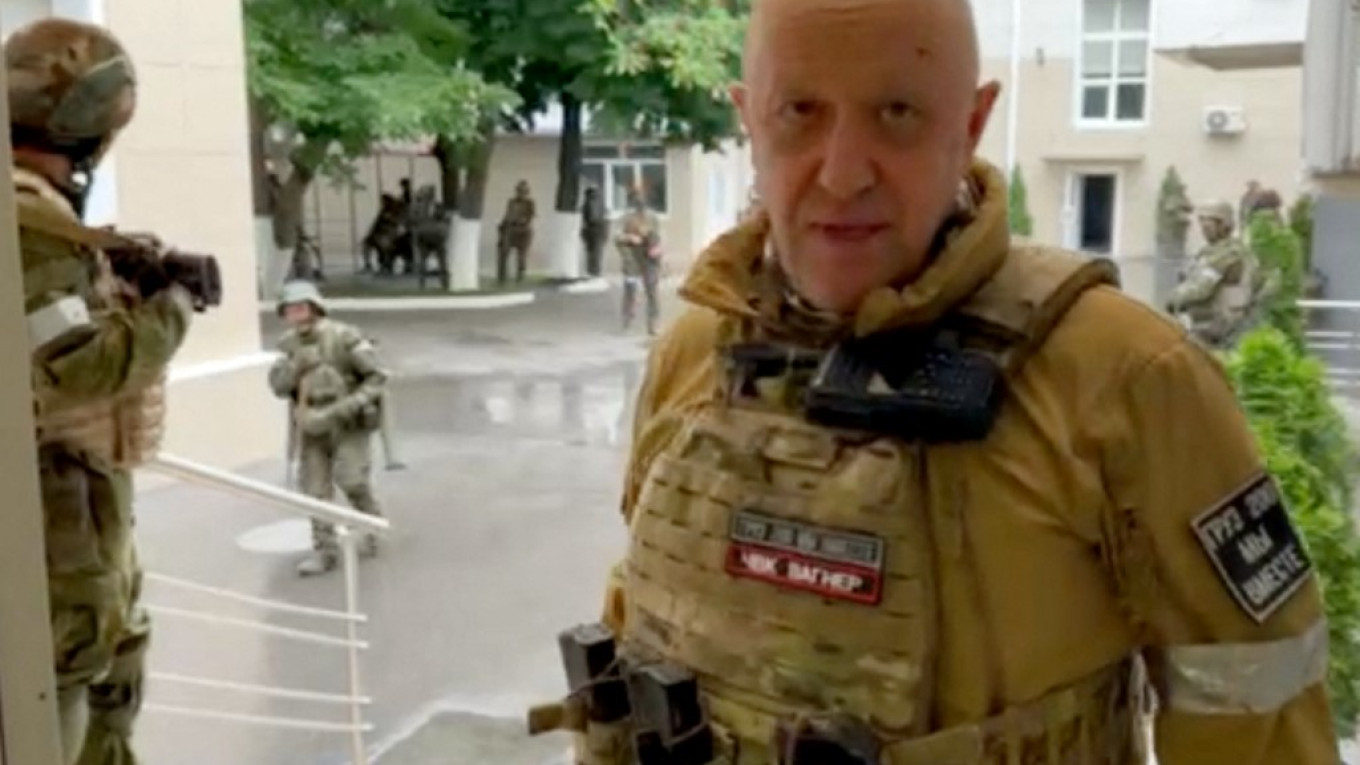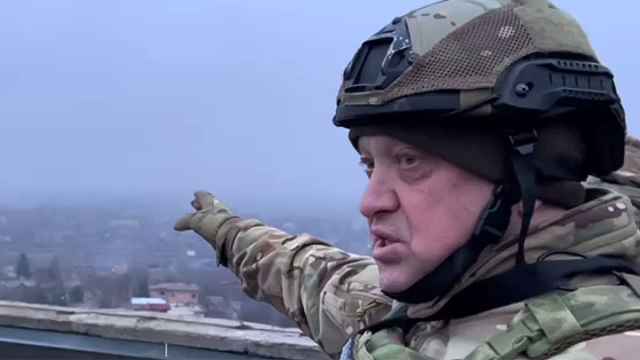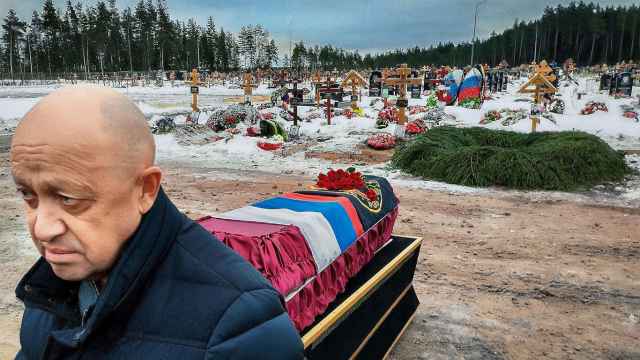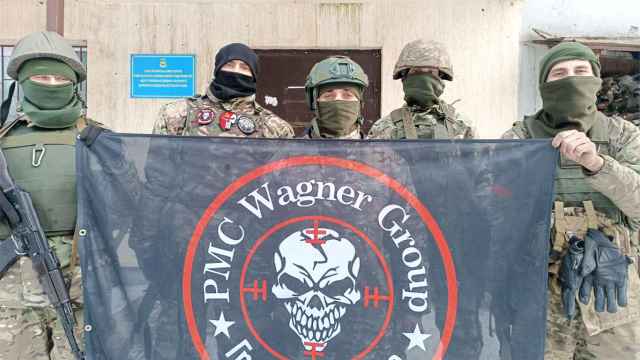Wagner mercenaries were headed back to base on Sunday after Russia's President Vladimir Putin agreed to allow their leader to avoid treason charges and accept exile in Belarus.
The agreement ended the immediate threat that Yevgeny Prigozhin's private army could storm Moscow, but analysts said Wagner's revolt had exposed Putin's rule as more fragile than had been thought.
"Anti-terror" security measures were still in place in Moscow on Sunday, although fewer police were visible and passers-by said they were unconcerned, despite Prigozhin's exact whereabouts remaining unclear.
He was last seen late Saturday in an SUV leaving Rostov-on-Don, where his fighters had seized a military headquarters, to the cheers of a group of young civilian bystanders, who came to shake his hand through the car window.
Trucks carrying armored vehicles with fighters on them followed his car.
His troops had left the Rostov military headquarters, and authorities in the Voronezh and Lipetsk regions northwards to Moscow said more forward Wagner units had also turned back.
There were reports that Wagner fighters had come as close as 400 kilometers from Moscow, while Prigozhin himself claimed that "in 24 hours we got 200 kilometers from Moscow."
His long-standing feud with military top brass over the conduct of the Russian operation in Ukraine boiled over on Saturday, when Wagner forces seized the Rostov base and advanced towards the capital.
Putin denounced the action as treason and vowed to punish the perpetrators, accusing them of pushing Russia to the brink of civil war — only to then accept a rapidly cobbled-together agreement to avert Moscow's most serious security crisis in decades.
'Russian blood'
Within hours of Prigozhin's surprise announcement that his forces would return to base to avoid "spilling Russian blood," the Kremlin said Putin's former ally would leave for Belarus.
Russia would drop the "armed rebellion" charges against Prigozhin and not prosecute Wagner troops, it said.
Ukraine reveled in the chaos, stepping up its own counter-offensive against Russian forces in the country and mocking Putin's apparent humiliation.
Analysts also said the deal had exposed weakness in the Russian president's grip on power.
Belarusian leader Alexander Lukashenko said he had negotiated the truce with Prigozhin. Moscow thanked him, but observers noted that an intervention by Lukashenko, usually seen as Putin's junior partner, was itself an embarrassment.
Little is known about the deal, with Minsk saying simply that "negotiations continued throughout the day."
Asked if Prigozhin had been given a guarantee that he would be able to leave to Belarus, Kremlin spokesman Dmitry Peskov told domestic media: "It is the word of the president of Russia."
In Ukraine, President Volodymyr Zelensky's senior aide Mykhailo Podolyak tweeted: "Prigozhin humiliated Putin/the state and showed that there is no longer a monopoly on violence."
Russia insisted the rebellion had no impact on its faltering Ukraine campaign and the day after the mutiny said it had repelled new offensive attacks by Ukrainian forces.
Kyiv, however, said the unrest offered a "window of opportunity" for its long-awaited counter-offensive.
Ukraine also said Sunday that the death toll on this weekend's strike on Kyiv rose to five, with two more bodies recovered from the rubble in the capital's Solomyanski district.
Shock troops
Wagner fighters were often thrown into the front of Russia's advance in Ukraine, made up of volunteers, ex-security officers as well as thousands of convicts Prigozhin had recruited.
The outfit also conducts several operations in the Middle East and Africa.
These missions are seen to have the Kremlin's backing and amount to Russian influence operations to curry favor with African governments and win access to mineral resources.
Independent political analyst Konstantin Kalachev told AFP: "The crisis of institutions and trust was not obvious to many in Russia and the West yesterday. Today, it is clear.
"Yesterday's call for unity made by representatives of the elites only confirmed this. Behind these is a crisis of institutions and fears for themselves," he said.
He noted that Russian leaders would be concerned by the sight of civilian onlookers applauding Wagner units in Rostov.
"Putin's position is weakened," he said. "Putin underestimated Prigozhin, just as he underestimated Zelensky before that. He could have stopped this with a phone call to Prigozhin but he did not."
The Institute for the Study of War, a Washington-based think tank, said: "The Kremlin now faces a deeply unstable equilibrium.
"The Lukashenko-negotiated deal is a short-term fix, not a long-term solution, and Prigozhin's rebellion exposed severe weaknesses in the Kremlin and Russian MoD."
Mercenary legion
U.S. Secretary of State Antony Blinken said, in an interview with CBS News, that Wagner's short-lived uprising had marked "a direct challenge to Putin's authority" and "shows real cracks" in Russian state authority.
Italian Foreign Minister Antonio Tajani told the daily Il Messaggero: "The myth of the unity of Putin's Russia is over. This internal escalation divides the Russian military alliance.
"It's the inevitable outcome when you support and finance a legion of mercenaries," he said.
China's foreign minister Qin Gang met Russia's deputy foreign minister Andrei Rudenko in Beijing on Sunday.
Afterwards the Chinese foreign ministry declared the mercenary revolt Russia's "internal affair" but expressed support for Putin's government.
"As a friendly neighbor and a new era comprehensive strategic cooperative partner, China supports Russia in protecting national stability and achieving development and prosperity," it said.
A Message from The Moscow Times:
Dear readers,
We are facing unprecedented challenges. Russia's Prosecutor General's Office has designated The Moscow Times as an "undesirable" organization, criminalizing our work and putting our staff at risk of prosecution. This follows our earlier unjust labeling as a "foreign agent."
These actions are direct attempts to silence independent journalism in Russia. The authorities claim our work "discredits the decisions of the Russian leadership." We see things differently: we strive to provide accurate, unbiased reporting on Russia.
We, the journalists of The Moscow Times, refuse to be silenced. But to continue our work, we need your help.
Your support, no matter how small, makes a world of difference. If you can, please support us monthly starting from just $2. It's quick to set up, and every contribution makes a significant impact.
By supporting The Moscow Times, you're defending open, independent journalism in the face of repression. Thank you for standing with us.
Remind me later.






